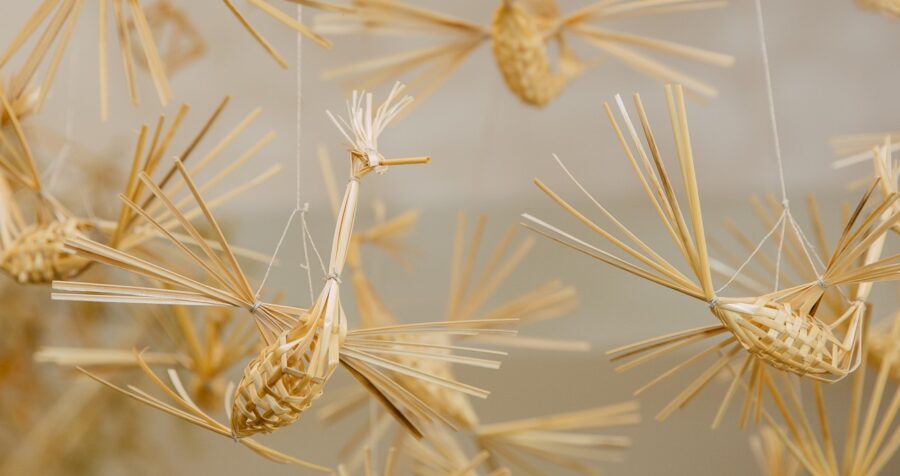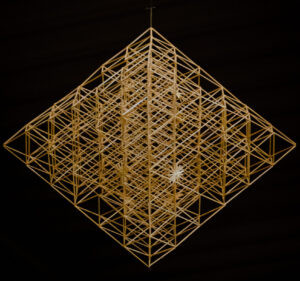Virtual Straw Gardens Gallery

Background
The website www.sodai.eu in Lithuanian and English was initiated at the end of 2020 by Vilnius Ethnic Culture Centre as a platform to introduce and promote the tradition of straw gardens (a type of craft resulting from volumetric straw articles in complex geometric forms, serving for aesthetic, ceremonial and festal purposes). The website provides structured information on straw gardens’ research, related events and articles, as well as presents straw gardens’ makers, mostly craftswomen.
Vilnius Ethnic Culture Centre, established in 1992 by Vilnius City Municipality, aims to promote traditional cultural activities, including the straw gardens’ tradition which brings together the community of straw gardens’ makers/artisans during theoretical lectures, practical straw gardens making workshops and educational activities. They attract not only individuals and families, but also groups of students and teachers. The skills acquired during the educational activities help technology and ethnic culture school teachers, class tutors group leaders, primary school teachers and non-formal educators to integrate the knowledge and skills of straw gardens’ making into their classes.

Photo: Roberta Kalinauskaitė
Numerous participants of activities related to straw gardens expressed their need for a knowledge database, which resulted as a dedicated website www.sodai.eu that aims to spread information both among straw gardens’ makers and all those interested in the subject.
Actually the main page of the website is a virtual garden gallery, where one may view 28 different straw garden models at all angles with the help of 3D computer graphics. This gives an opportunity to see the variety of shapes, structures and details prevalent in the creations of straw gardens’ makers.
The website page About Straw Gardens contains articles on the subject and a wide range of videos: educational videos, documentaries, interviews with garden makers, conference recordings, etc. The website also includes a news section featuring current highlights, including information about ongoing straw gardens exhibitions, training workshops and other related news.
The website also serves as a straw gardens’ makers directory, for the first time publishing all of 66 currently active Lithuanian straw garden makers and their contacts. This enables the visitors to familiarize with the artisans, to find a straw gardens’ makers, to order a personal straw garden, to get advises for new craftsmen from the masters, to find trainers for the workshops , to ask questions regarding technologies and skills. The directory also brings together representatives of non-governmental associations: some of the featured garden makers are members of the straw gardens makers‘ association Dangaus Sodai (Eng. Gardens of Heaven), whose works are also featured on the website.

Photo: Alan Ščerbakov
Identifying threats and need for safeguarding
A few decades ago, the tradition of straw gardens was nearly forgotten, with only a few women left to practice the craft. The tradition declined due to various reasons: the loss of the relevant ceremonial function of the garden, the fragile and nondurable material, and the lack of raw material (less and less grain suitable for straw garden making is grown due to the changes in agriculture). Since 1992, the tradition revived by Vilnius Ethnic Culture Centre, has begun to recover, but it still faces the same threats, as well as the new ones.
The lack of dissemination and promotional activities was one of them. In the past, learning and transmitting straw gardens’ making skills and knowledge was possible only during one-off events: training courses, camps, and an occasional workshop, information on which was not widely published. One could personally learn the craft from artisans, but they were not easy to find. Information about straw gardens was not widely available or only accessible to a limited group of interested people.
Another emerging threat to the straw gardens’ tradition is the disappearance of some traditional, distinctive forms and shapes that are characteristic only to certain regions. Experienced straw gardens’makers are often elderly, and passing on their knowledge and skills to the next generation is not always guaranteed.
To ensure the survival of this tradition, public awareness raising, transmission and dissemination are needed. Although the craft represents a type of individual creativity, strengthening the community of straw gardens’ makers is essential, as well as encouraging the establishment of non-governmental organizations (such as the association Dangaus Sodai).

Passing on the skills. Photo: Agnė Būdvytytė,
Objectives
Objectives and goals
The task of the Vilnius Ethnic Culture Centre and the website www.sodai.eu is to monitor and promote the development of the tradition by raising public awareness of the diversity of straw gardens’ forms, practitioners, bearers, transmitters and promoters of the tradition, by informing about the possibilities to enhance theoretical and practical knowledge and skills, and by updating, reflecting on and interpreting the tradition.
This website aims to become a certain platform that will benefit the community of straw gardens’ makers by enabling the artisans to see the latest creations of their colleagues or to promote their own articles.
It is one of the means ensuring the vitality of the tradition, helping to transmit knowledge and skills to the new generations, and of strengthening the community itself.
How it was done
Vilnius Ethnic Culture Centre has set up a website www.sodai.eu that contains all the information related to the straw gardens’ making tradition: articles, videos, news and contacts of straw gardens’ makers. It also includes a virtual garden gallery where one may see various models of straw gardens.
The section Straw Garden Makers of the website contains contacts of straw gardens’ makers and a collection of photos. The website currently features 28 gardens. Created with the help of computer graphics and placed in the virtual gallery, the models of the straw gardens represent a variety of forms of gardens made in Lithuania.
The creators of the website www.sodai.eu are going to periodically update the collection of articles of artisans working in this field, even those who are beginners but wish to share their achievements. The website database is currently incomplete; it will be expanded and will include more works of currently active artisans and museum exhibits typical to certain regions.

Photo: Alan Ščerbakov
Summing up. Did it work? Some experiences.
This website is still a new project, however it is a good safeguarding practice of creating a universally accessible and attractive platform that brings together information on the tradition of straw gardens.
The virtual garden gallery has served during the Covid-19 pandemic as an exhibition that could be viewed from home. This gallery format enables familiarizing with straw gardens and their authors, both in Lithuania and abroad, as the gallery is bilingual.
Such a website is a necessary tool to enhance and promote the tradition of straw gardens, however it is insufficient for wider dissemination purposes. To fully use the website potential and to expand its accessibility, so that it is used by the maximum number of the makers’ community members and by those interested in the tradition, the website will be expanded and diversified, and the communication will be enhanced.
Key factors
1. Broad participation
The platform has been created to gather a large number of Lithuanian straw gardens’ makers. Currently 66 makers’ contacts are published on the website (mostly members of the non-governmental organization, such as the association Dangaus Sodai), but there are more of them in Lithuania, so the list will be expanded. The platform will enable young generation to better familiarize with the tradition.
2. Dissemination
Information on this platform has been disseminated through various means of communication of cultural centres and NGOs in LIthuania.
3. The tool has been created to promote the development and market for the craft
The tool (website) has been created to promote the development of the craft, as it is the database which may help one to find a particular straw gardens’ maker and commission a straw garden for personal use.
4. Focus on keeping the information updated
A directory representing the diversity of forms of this tradition has been created and will be further updated.
